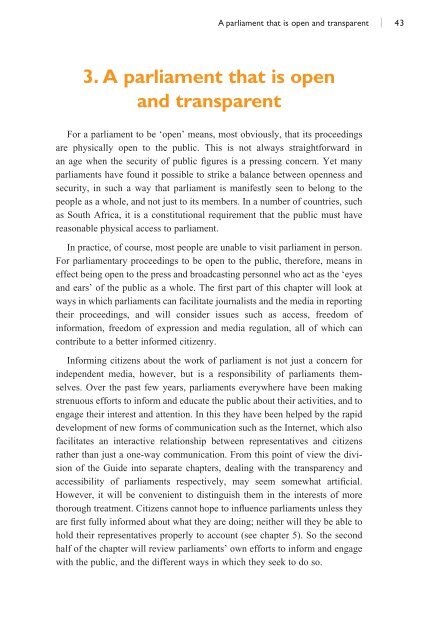PARLIAMENT AND DEMOCRACY - Inter-Parliamentary Union
PARLIAMENT AND DEMOCRACY - Inter-Parliamentary Union
PARLIAMENT AND DEMOCRACY - Inter-Parliamentary Union
You also want an ePaper? Increase the reach of your titles
YUMPU automatically turns print PDFs into web optimized ePapers that Google loves.
A parliament that is open and transparent I 43<br />
3. A parliament that is open<br />
and transparent<br />
For a parliament to be ‘open’ means, most obviously, that its proceedings<br />
are physically open to the public. This is not always straightforward in<br />
an age when the security of public figures is a pressing concern. Yet many<br />
parliaments have found it possible to strike a balance between openness and<br />
security, in such a way that parliament is manifestly seen to belong to the<br />
people as a whole, and not just to its members. In a number of countries, such<br />
as South Africa, it is a constitutional requirement that the public must have<br />
reasonable physical access to parliament.<br />
In practice, of course, most people are unable to visit parliament in person.<br />
For parliamentary proceedings to be open to the public, therefore, means in<br />
effect being open to the press and broadcasting personnel who act as the ‘eyes<br />
and ears’ of the public as a whole. The first part of this chapter will look at<br />
ways in which parliaments can facilitate journalists and the media in reporting<br />
their proceedings, and will consider issues such as access, freedom of<br />
information, freedom of expression and media regulation, all of which can<br />
contribute to a better informed citizenry.<br />
Informing citizens about the work of parliament is not just a concern for<br />
independent media, however, but is a responsibility of parliaments themselves.<br />
Over the past few years, parliaments everywhere have been making<br />
strenuous efforts to inform and educate the public about their activities, and to<br />
engage their interest and attention. In this they have been helped by the rapid<br />
development of new forms of communication such as the <strong>Inter</strong>net, which also<br />
facilitates an interactive relationship between representatives and citizens<br />
rather than just a one-way communication. From this point of view the division<br />
of the Guide into separate chapters, dealing with the transparency and<br />
accessibility of parliaments respectively, may seem somewhat artificial.<br />
However, it will be convenient to distinguish them in the interests of more<br />
thorough treatment. Citizens cannot hope to influence parliaments unless they<br />
are first fully informed about what they are doing; neither will they be able to<br />
hold their representatives properly to account (see chapter 5). So the second<br />
half of the chapter will review parliaments’ own efforts to inform and engage<br />
with the public, and the different ways in which they seek to do so.

















